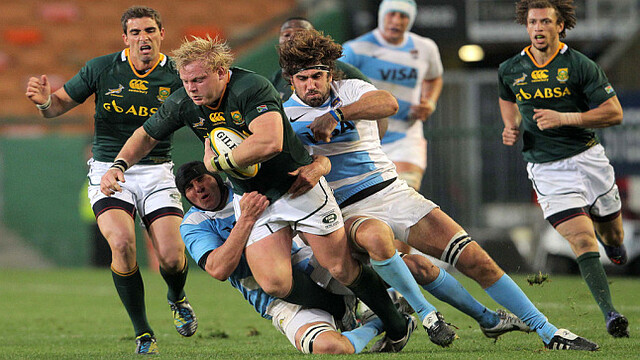“All we lacked was knowing how to win it,” said a desperately disappointed Argentina coach Daniel Hourcade after watching his side came agonisingly close to their first Rugby Championship victory over South Africa in Salta last Saturday.
Leading 28-16 with a little over 20 minutes remaining in the match, it looked as though the Pumas were closing in on an historic triumph and deservedly so having outplayed their formidable rivals for much of the contest to that point. But a bold and brilliant Boks side turned the game on its head and eventually claimed a narrow 33-31 victory.
It is a painfully familiar story for Argentina since being granted a long overdue place at the southern hemisphere’s top table.
In Mendoza in 2012 during their debut season in The Rugby Championship, under the guidance of Santiago Phelan, they held a lead over South Africa going into the final quarter only to allow the Bok to escape with a 16-all draw. Later the same year on the Gold Coast, it was a similar story against Australia who rallied late in the game to claim a 23-19 win.
The 2013 Rugby Championship included two painful maulings at the hands of South Africa in Johannesburg (73-13) and Australia in Rosario (54-17) but there were slightly more palatable defeats. They held a narrow lead over the Boks in Mendoza going into the final 10 minutes only for Morne Steyn’s boot to swing the match South Africa’s way (22-17). Momentum also took them to within striking range against Australia in Perth but they ran out of steam and had to settle once again for a narrow loss (14-13).
This year’s campaign has now begun with two narrow defeats to South Africa – the Boks claiming a 13-6 victory at a rain-swept Pretoria – and their Championship record now stands at Played 14, Won 0, Drawn 1, Lost 13. It doesn’t make for pretty reading but make no mistake, and don’t be fooled by the simply ridiculous International Rugby Board rankings that currently state that Argentina are the 12th best side in the world – behind such heavyweights as Fiji and Japan, they deserve their place in an annual competition alongside the elite.
Have they forgotten how to win these games? Some would suggest they have never known how to beat the world’s best having not once beaten New Zealand, a 21-all draw in 1985 being their best return, or South Africa – and not seen off Australia since 1997. Others may argue against this, pointing to their headline-grabbing run of form at the 2007 Rugby World Cup but the draw was kind to them and they avoided the southern hemisphere giants until the semi-finals where South Africa put them to the sword.
It is not that they are short of quality with the likes of Juan Martin Fernandez Lobbe and Juan Martin Hernandez two stand out talents in a squad boasting power, pace and skill in abundance that troubled South Africa time and again in their two most recent encounters.
They have also survived the departure of a host of familiar faces and RWC’07 heroes such as Agustin Pichot, Felipe Contepomi and Rodrigo Roncero with development no doubt aided by exposure to such a competition at The Rugby Championship.
The physical and mental demands of The Rugby Championship are certainly a significant factor. Going from a standing start to playing the sport’s best six times in a relatively short period of time would test the mettle and depth of any side but you will not hear them complain.
Hourcade must also contend with the fact that the majority of his players are based in Europe which must impact on preparations although the forthcoming addition of a Super Rugby franchise in Buenos Aires from 2016 and the expected return of the country’s leading players will be a huge boost on that front.
Despite boasting plenty of Test caps in key positions, this is only their third year in the competition and so experience may also be telling especially in crucial moments. It is also worth remembering that they are playing the best in the world – all former world champions.
These are teams oozing with talent able to turn a game in an instant and possessing world-class players and leaders such as the Boks’ Jean de Villiers whose decision to turn down a shot at the posts late in the game in Salta in favour of a lineout that would eventually produce a try arguably the key moment. Do the Pumas lack that kind of composure and confidence when the heat is on?
It is hard for Argentina and it is not about to get any easier with New Zealand and Australia and thousands of air miles looming in the coming months. And they are not competing against just one side but all three rivals who, like the rest of the world, are well aware that a Pumas victory against any one of them would serve as an affirmation of their class and quality and further fuel their desire to unprecedented heights.


